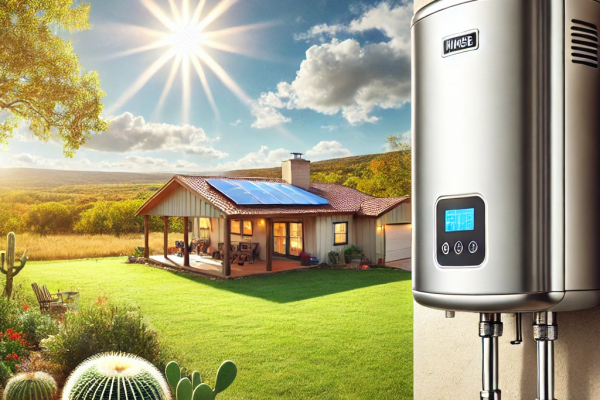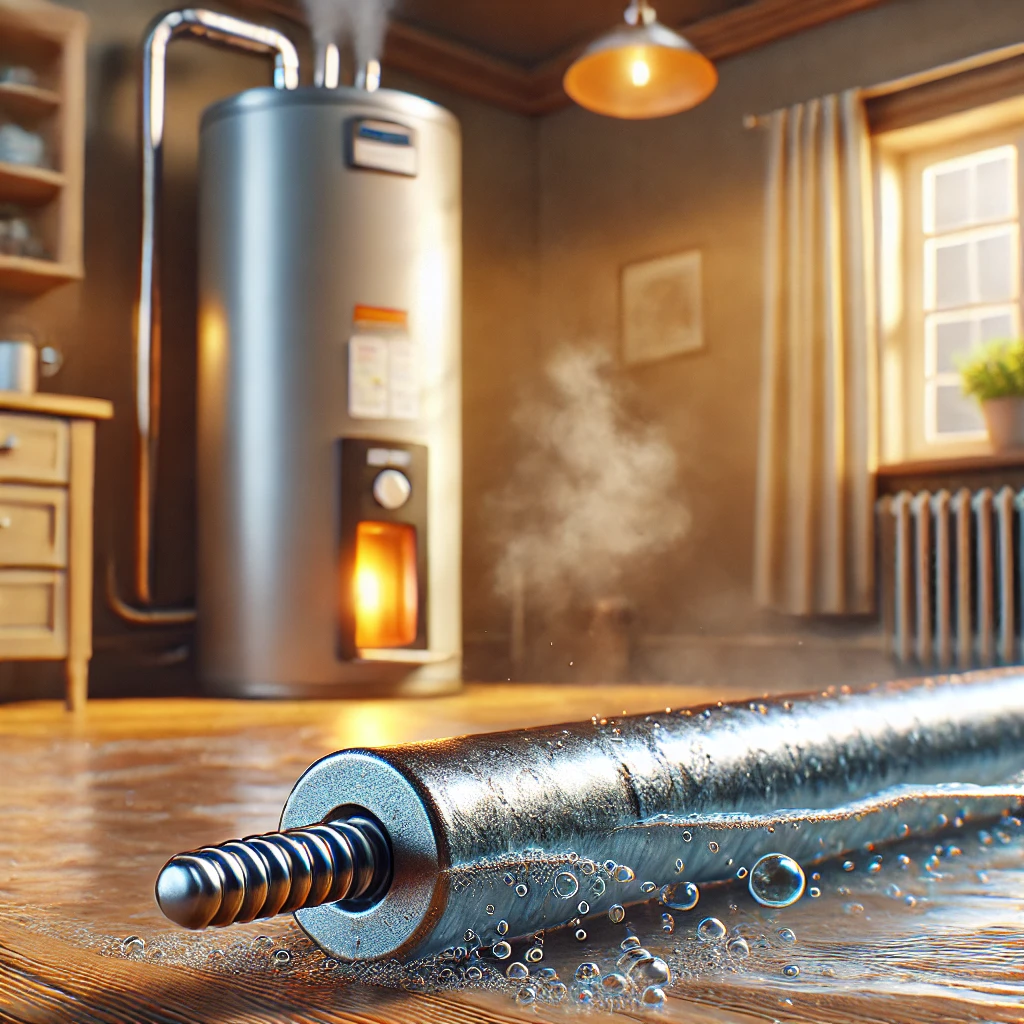
Tankless Water Heaters: How Texas Homeowners Save Money and Improve Comfort in Their Homes
Introduction
Imagine having an endless supply of hot water, all while reducing your energy bills and saving space in your home. This is the reality for homeowners who switch to tankless water heaters. In Texas, where the climate can be scorching and water conditions often challenging, these systems are quickly gaining popularity. Their energy efficiency, space-saving design, and ability to provide a consistent flow of hot water make them an excellent choice for many homeowners.
In this article, we will explore everything you need to know about tankless water heaters: how they function, their benefits and drawbacks, advice for selecting the right model, and installation and maintenance tips. By the end of this guide, you'll understand why tankless systems are a smart investment, particularly for Texas residents.
How Do Tankless Water Heaters Work?
Tankless water heaters are quite different from traditional tank systems. These units heat water on demand, which means they only activate when you turn on the hot water tap. Water flows through the unit and passes over heating elements—either electric or gas-powered—which rapidly raise the water temperature to the desired level.
In comparison, traditional water heaters store large volumes of water in a tank and maintain its temperature continuously, even when it's not being used. This leads to constant energy consumption and unnecessary waste.
To make an analogy: a traditional water heater is like a thermos, which constantly keeps water hot but uses energy in the process. A tankless water heater, on the other hand, operates more like a coffee machine, heating water only when you need it.
Why Are Tankless Water Heaters Popular in Texas?
Texas is known for its unique climate, and these conditions make tankless systems particularly appealing. Here's why:
Energy Savings
In hot climates like Texas, traditional tank water heaters require more energy to maintain water temperature, especially if they're installed in garages or outdoor areas where temperatures can fluctuate. Tankless systems eliminate this constant energy drain by heating water only when necessary. This can significantly reduce energy consumption and save on utility bills, especially during the warmer months when energy use spikes.
Hard Water Compatibility
Many areas in Texas experience hard water, which can cause scale buildup in traditional water heaters. While tankless water heaters are not immune to this issue, they tend to handle hard water conditions more efficiently. With proper maintenance, tankless systems can continue to operate optimally, making them a better choice in areas with poor water quality.
Space Efficiency
In homes with limited space, such as apartments or smaller houses, tankless units provide a compact and practical solution. These systems are typically mounted on the wall, freeing up valuable floor space. Traditional tank heaters, by contrast, take up significant room, which may be a drawback in tight spaces.
Lower Utility Costs
Electricity and gas bills in Texas can add up, especially during the summer months. Since tankless water heaters heat water on demand, they only consume energy when hot water is needed, making them a more cost-effective option in the long run.
Benefits of Tankless Water Heaters
Tankless water heaters offer several advantages, especially for homeowners in Texas.
Unlimited Hot Water
A properly sized tankless system ensures you’ll never run out of hot water, no matter how many people are using it at once. This is especially helpful for larger families or households with high water usage.
Space-Saving Design
Unlike traditional water heaters, which can take up significant space in a utility room or basement, tankless units are compact and can be installed in tight spaces. Their space-saving design makes them ideal for small homes, apartments, or homes with limited storage space.
Longevity
One of the most notable benefits of tankless water heaters is their longevity. These systems typically last about 20 years, which is nearly double the lifespan of conventional water heaters. This extended lifespan can provide a substantial return on investment over time.
Energy Efficiency
Tankless systems are known for their energy efficiency. They can save up to 30% on energy bills when compared to traditional tank models. This is because they don’t waste energy by keeping water hot all the time.
Environmental Benefits
Since tankless water heaters consume less energy, they also reduce your carbon footprint. For homeowners who are committed to sustainable living, these systems align with environmental goals and contribute to a greener lifestyle.
Drawbacks of Tankless Water Heaters
While tankless systems offer numerous benefits, there are a few potential drawbacks that homeowners should consider.
Higher Initial Costs
The upfront cost of purchasing and installing a tankless water heater can be higher than that of a traditional tank system. However, the long-term savings on energy bills can offset this initial investment.
Limited Flow Capacity
Tankless water heaters are designed to heat water on demand, which means their flow capacity can be limited. If multiple appliances or faucets use hot water simultaneously, the system's performance may drop unless you opt for a unit with a higher flow rate.
Water Pressure Requirements
For optimal performance, tankless water heaters require stable and sufficient water pressure. If your home’s water pressure is too low, the system may not work efficiently, leading to inadequate heating or interruptions in service.
Regular Maintenance
In regions with hard water—like much of Texas—regular maintenance is crucial to prevent scale buildup. This may involve descaling the system every 6–12 months to ensure it continues to operate at peak efficiency.
Choosing the Right Tankless Water Heater
Selecting the right tankless water heater for your home requires careful consideration of several factors. Here are the key points to keep in mind:
1. Calculate Your Hot Water Needs
Start by assessing how much hot water your household uses. Consider the number of people in the home and how many appliances will need hot water at the same time. For example, a shower typically uses about 2.5 gallons of water per minute (GPM), while a washing machine consumes around 2 GPM. Knowing your hot water needs will help you choose a unit with the appropriate flow rate.
2. Choose the Right Fuel Type
Tankless water heaters come in two main types: gas and electric. Gas-powered units are ideal for larger households because they heat water faster and in larger quantities. Electric models, on the other hand, are more compact and cost-effective, making them suitable for smaller homes or apartments.
3. Consider Performance Metrics
Look for units that are rated by their flow rate (measured in GPM). This ensures the unit can meet your household’s hot water demands. Be sure to select a system that offers the capacity needed to handle multiple water sources running at the same time.
4. Address Hard Water Issues
Since hard water is common in Texas, consider installing a water softener or filtration system alongside your tankless water heater. This can help reduce scale buildup and prolong the life of your system.
Installation Process
Installing a tankless water heater requires professional expertise. Here’s a brief overview of the installation process:
Assessment of Existing Systems
Before installation, a professional plumber will assess your home’s water pressure, gas supply, and electrical system to ensure they meet the unit’s requirements. This step ensures the tankless system will function efficiently once installed.
Selecting the Installation Location
Tankless water heaters can be installed either indoors or outdoors, depending on the model and the layout of your home. The location should allow for easy access to utilities and proper ventilation for gas models.
Connecting to Utilities
Electric tankless units require proper wiring, while gas-powered models may need additional ventilation to ensure safety. A professional will make sure the system is connected correctly to both water and power sources.
Testing and Calibration
Once installed, the system is thoroughly tested to ensure it delivers hot water at the correct temperature and flows efficiently. The plumber will calibrate the system to ensure it meets your household’s needs.
Maintenance Tips
To ensure the longevity and efficiency of your tankless water heater, follow these maintenance tips:
Descale Regularly
In areas with hard water, it’s important to descale your unit every 6–12 months to prevent mineral buildup. This will help maintain efficient operation and prevent costly repairs.
Inspect Filters and Components
Check the filters and heating elements periodically for any clogs or damage. Replacing worn components can help avoid malfunctions and keep the system running smoothly.
Install a Water Softener
A water softener can help reduce the amount of scale buildup, especially in areas with hard water. Installing one in conjunction with your tankless system can extend its lifespan and improve efficiency.
Schedule Annual Inspections
Have a professional plumber inspect your system once a year to identify any potential issues early on. Annual maintenance can prevent problems from becoming more serious and ensure your system remains in top condition.
A Real-Life Success Story from Texas
Maria and John, a family of five from Austin, Texas, decided to upgrade to a tankless water heater after facing frequent shortages of hot water. With teenagers in the household, their morning showers were often interrupted by cold water.
After switching to a tankless system, their family enjoyed endless hot showers, even during the busiest times of the day. Their monthly energy bills also decreased by 25%. "We no longer have to fight for the first shower," Maria says. "It’s been a game-changer for our household."
Conclusion
Tankless water heaters offer a blend of modern convenience, energy efficiency, and long-term savings. For Texas homeowners, the benefits of these systems are even more pronounced due to the state's hot climate and water conditions. Although the initial investment can be higher, the long-term savings on energy bills, improved comfort, and enhanced reliability make tankless water heaters a smart choice.
Whether you’re building a new home or upgrading an older system, a tankless water heater could be the perfect solution to meet your household’s






